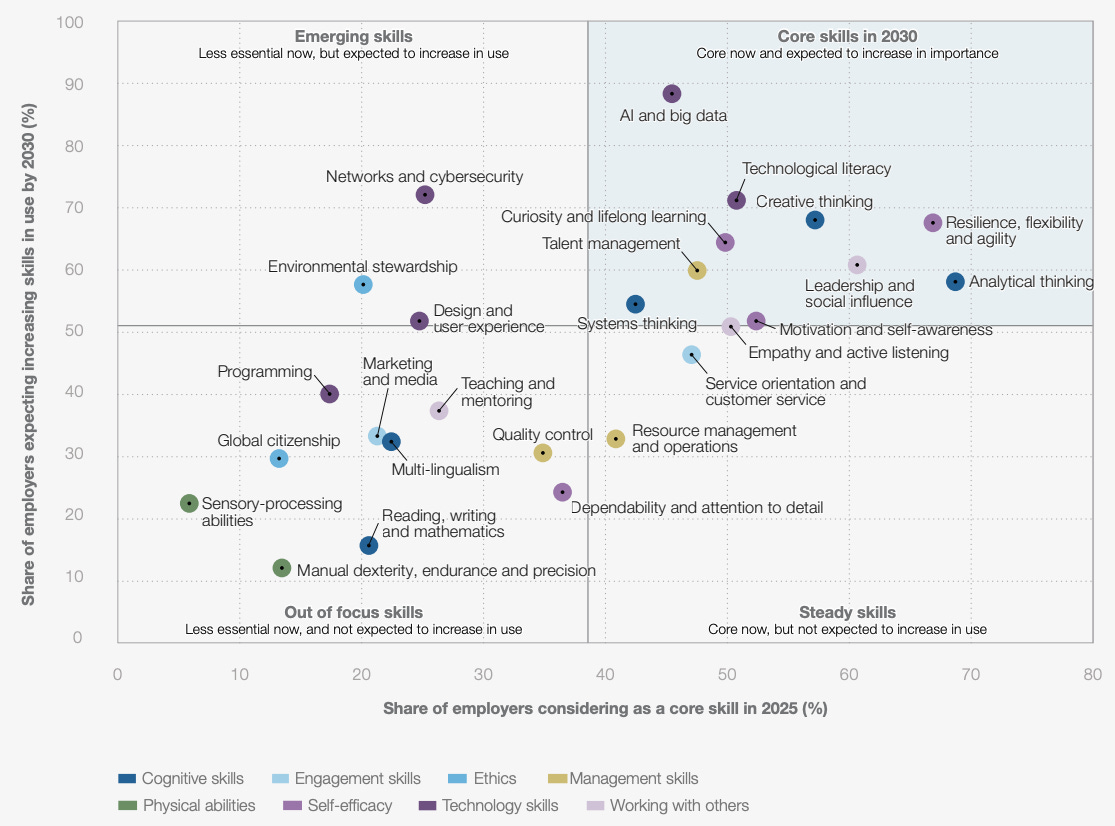Adaptability, Creativity, Tech Fluency: The Skills Defining Work Now
The World Economic Forum’s Future of Jobs Report offers a clear signal for product managers, technologists, and business leaders: the skills that matter most in the coming decade are not the same as those that powered the past. Well, the report is confirming what we are already seeing in full force:
By 2030, success will hinge less on manual or routine capabilities and far more on adaptability, creativity, and fluency in technology.
(Source: Future of Jobs Report - 2025)
From Core to Critical
Employers already prize analytical thinking, creativity, and resilience. The survey shows these will only grow more important. Skills such as technological literacy, creative problem solving, and flexibility in the face of change are expected to be among the most valuable differentiators. For teams building products, this translates into cultivating people who can handle ambiguity, generate novel solutions, and adopt new tools quickly.
The Rise of Emerging Skills
The data also highlights a set of “emerging skills” that are not yet widespread but will be central to the 2030 workplace. These include AI and big data, networks and cybersecurity, and environmental stewardship. Each reflects broader economic and social shifts:
AI is rapidly embedding itself into product development, decision-making, and customer experiences.
Cybersecurity is a baseline expectation as connected systems multiply.
Sustainability is no longer a niche concern but a core business responsibility.
For product leaders, these areas suggest where future hiring, training, and partnerships will be concentrated.
The Decline of Traditional Capabilities
In contrast, several skills are fading. Abilities like manual dexterity, endurance, precision, and quality control are projected to decline as automation, robotics, and advanced manufacturing systems take over repetitive work. While these were once competitive advantages, they will matter less in knowledge-driven industries.
Human Skills Still Anchor Teams
Not everything is shifting. Human-centric skills—empathy, leadership, active listening, and service orientation—remain steady. They may not grow as fast as digital literacy or AI expertise, but they are essential to building high-performing teams and customer trust. These relational strengths are harder to automate and continue to distinguish effective organizations.
The Takeaways
The big picture is clear: the next decade rewards those who combine human adaptability with technological fluency. Product managers and technologists should:
Invest in continuous learning to stay ahead of new tools.
Build resilience and creativity as team norms, not individual exceptions.
Balance technical training with human skills like empathy and influence.
Anticipate sustainability and ethical awareness as mainstream product requirements as AI gains broader adoption.
The workforce of 2030 will not be defined by who can execute tasks the fastest, but by who can adapt, learn, and create value in systems where humans and technology work together. (Pro tip: 2030 is here and now; these skills are required today)


